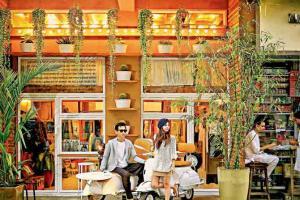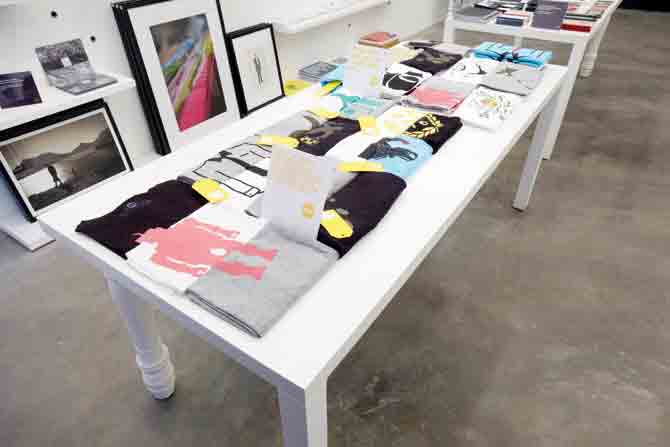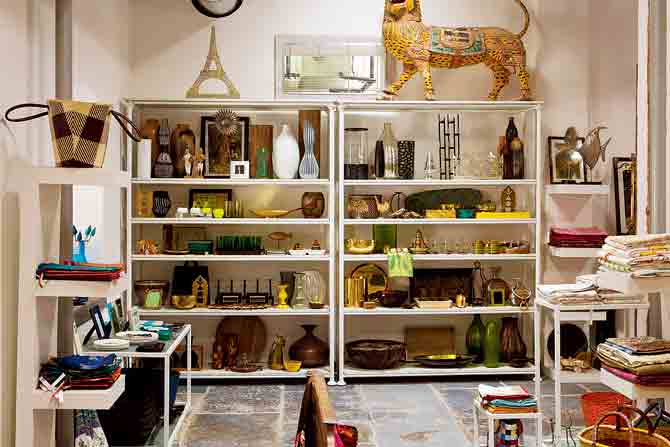It has taken a virus outbreak to expose the fault with top-heavy fashion retail models as lean, agile concept stores believe they will tide over the crisis

Noorie Sadarangani's store Obataimu is an experiential retail space with tailoring school
If it weren't for a Vespa perennially parked outside the Kala Ghoda store, you'd probably pass by Obataimu and miss it. The indie concept store's capacity to surprise, have a customer feel like they have embarked on a voyage of discovery through the zigzag bylanes of Mumbai's art district, does not end there. Inside the glass-walled façade of the six-year-old boutique is housed a resolute inventory model—to design and tailor clothes, and leave behind zero waste.

While retailers may find 600 sq ft snug, its founder and designer Noorie Sadarangani felt it was enough to imagine a consolidated workshop, tailoring school and retail area. "Obataimu has always resisted the chain model," writes Sadarangani in an email. "We are more of a studio than a traditional shop. I definitely think this resistance to the conventional model makes it much easier to stay alive in such extraordinary times when life has become stranger than fiction."

A few steps ahead and around the bend, is Filter, an art and design concept store that's picked up a cult-like following for introducing Mumbai-inspired collector's pieces—stationery, books, home décor, posters, photographs and clothing. Created by adman Alok Nanda, the store operates out of 600 sq ft space staffed by Vipul. Ajoy Advani heads the role of creative director. "Filter turns 10 at the end of the year, and we had planned to make a few cosmetic changes. But now with the lockdown, we don't know," says Advani.
 Ajoy Advani is the creative director at Filter, an eclectic design and art store
Ajoy Advani is the creative director at Filter, an eclectic design and art store
A short walk south to Colaba, behind the Taj Mahal Hotel, is Samyukta Nair's Clove; a two-year-old experiential retail store focused on everyday luxury. "We are small but agile," stresses Nair. "My staff of two consists of fashion students, while I curate the merchandise," she says, staying clear of a top-heavy management model. Clove's 700 sq ft interiors are designed to make the customer feel like "it's your home", and carries an assortment of Made in India young and known labels across
fashion and lifestyle categories including home décor, footwear and chocolates. With entrepreneurial experience in food—Nair has co-founded Jamavar restaurant at Mayfair, London—and now fashion, she says the challenges they pose are distinct. "The store audience is split between international tourists and Indian shoppers. But with the Coronavirus-enforced travel embargo, and restrictions to move around locally, we are using the lockdown as a time to understand the new customer. Comeback is always better than a setback," Nair says with a laugh.

While Sadarangani and Nanda have survived the ongoing lockdown restrictions because they own the property where their stores stand, Nair says that her landlord has been wonderfully lenient. All three extend intimate shopping experiences while practising lean operations and low overhead costs.
 Samyukta Nair, founder and curator of Clove
Samyukta Nair, founder and curator of Clove
Together they are part of the independent storeowner tribe of Mumbai that could offer a solution to the biggest crisis that the global fashion retail industry is facing. "The rules of retail are changing, irrespective of size or nature of business. The next big trend would highlight the importance of smaller, leaner, locally sourced and community focused formats," shares Maithili Ahluwalia, the erstwhile owner-curator of Bungalow Eight, a concept fashion and lifestyle address in Churchgate.

Maithili Ahluwalia
As the world settles into various degrees of lockdown, a freeze on supply chains, offices and shopping has sounded the death knell for department store giants, high street brands and venture-backed start-ups. The industry was already "On High Alert", but fast forward a few months, we are now on "red alert" with global fashion sales predicted to fall by up to 30 per cent in 2020 according to a report by the Business of Fashion and consultants McKinsey. After only two years, WWD reported, Carla Sozzani's concept retail space 10 Corso Como closed the doors of its New York location on April 1 , citing economy amid the Coronavirus crisis. The Neiman Marcus Group, one of the leading American department store chains, is expected to declare bankruptcy in the coming days reported The New York Times on April 21.
Against this tumultuous global retail landscape, its Indian counterparts are not entirely immune to the supply and demand setback. But if there's one remarkable takeaway from the crisis, it is this: the era of big—space, staff, budgets—has drawn to an end. "Small businesses could perhaps play a bit more of an advisory role in future macro-industry restructuring; sharing insights on being more holistic, communal and vertically integrated," Sadarangani thinks.

Bhagyashree Patwardhan rented three rooms in a Portuguese bungalow in Sangolda village around North Goa to launch Paper Boat Collective (PBC) in 2013. Her concept lifestyle store now occupies eight rooms, and an organic café in the courtyard. What remains unchanged is her determination to run a tight ship, provide sustenance to locals, and advocate diverse handmade and natural products befitting a contemporary and responsible India. Patwardhan says, "I've been mindful of keeping my business small. During the lockdown, my immediate priority is to take care of my staff of seven, pay their salaries."
 Originally from Pune, Bhagyashree Patwardhan lived in Mumbai before adopting Goa as her new home. She launched Paper Boat Collective in 2013, a concept store encapsulating everything charming about Goa, all under one roof
Originally from Pune, Bhagyashree Patwardhan lived in Mumbai before adopting Goa as her new home. She launched Paper Boat Collective in 2013, a concept store encapsulating everything charming about Goa, all under one roof
Part of her conscious framework also includes working exclusively with homegrown designers Maku, Shorshe, Crow, Karomi and House of Wandering Silks, and sustainable social enterprises such as Wild Ideas, Blue Mango and Avani Kumaon. "We've stayed away from big, established names, and believe in season-less, easy, comfortable clothing that works all year round," adds Patwardhan.
It's not as if no one saw it coming. The clicks-versus-bricks debate was already wearing thin as more retailers began considering multi-channel retail. Sadarangani says they were planning to launch an online shop concept in July this year with a show-and-tell experience and event space in Los Angeles. "We will move forward with the launch but with much simpler format and smaller budget," she says. For Filter, Advani feels it's hard to have an online presence even though there is a need to go digital. "We work on a small batch of orders to retain exclusivity, which makes it difficult to get around logistics between the two platforms," he explains. "It's worrisome," believes Nair, "not having an online presence during social distancing".
Patwardhan wonders how PBC, "a dream built to appeal to five senses—to amble, browse, touch, feel, enjoy the space and products—would translate in the digital format". And she is not alone.
Radhika and Abhishek Poddar launched Cinnamon in October 1999 on Walton Road in Bengaluru, making it among the first concept stores in India. In 2014, it moved address to the 19th century colonial-era property in the Ulsoor borough of the Garden City. "I am not much of an online shopper; somehow it cannot rival the physical store experience," says Radhika Poddar. A pair of flip flops displayed alongside books; cutlery and home décor sharing space with clothing rails, Cinnamon's buys are thrillingly different from standard department-store fare, curated by Radhika for last 20 years.

"Apart from featuring an artefact or two from Sri Lanka and Bali, we have singularly worked with local talent like Jason Cheriyan, and designers such as Gaurav Jai Gupta, Payal Khandwala, Eka and Sunita Shankar. The Made in India sentiment has almost become our defining aesthetic," Radhika feels.

Radhika and Abhishek Poddar launched Cinnamon in 1999, making it among the first concept stores in India
The Coronavirus outbreak and its impact on the economy has merely exposed the failing fundamentals of bloated fashion businesses, Ahluwalia suggests. The pause in business as usual could eventually open up opportunities to also contemplate the bigger picture. "To secure a future, retailers need to pause and interrogate deeply: is my business model sustainable and relevant to the environment; is the positioning and cost structure congruent with my vision; what is my value proposition; and who is my customer. Often, smaller, independent businesses have the strongest voice."
Catch up on all the latest Mumbai news, crime news, current affairs, and a complete guide from food to things to do and events across Mumbai. Also download the new mid-day Android and iOS apps to get latest updates.
Mid-Day is now on Telegram. Click here to join our channel (@middayinfomedialtd) and stay updated with the latest news
 Subscribe today by clicking the link and stay updated with the latest news!" Click here!
Subscribe today by clicking the link and stay updated with the latest news!" Click here!







